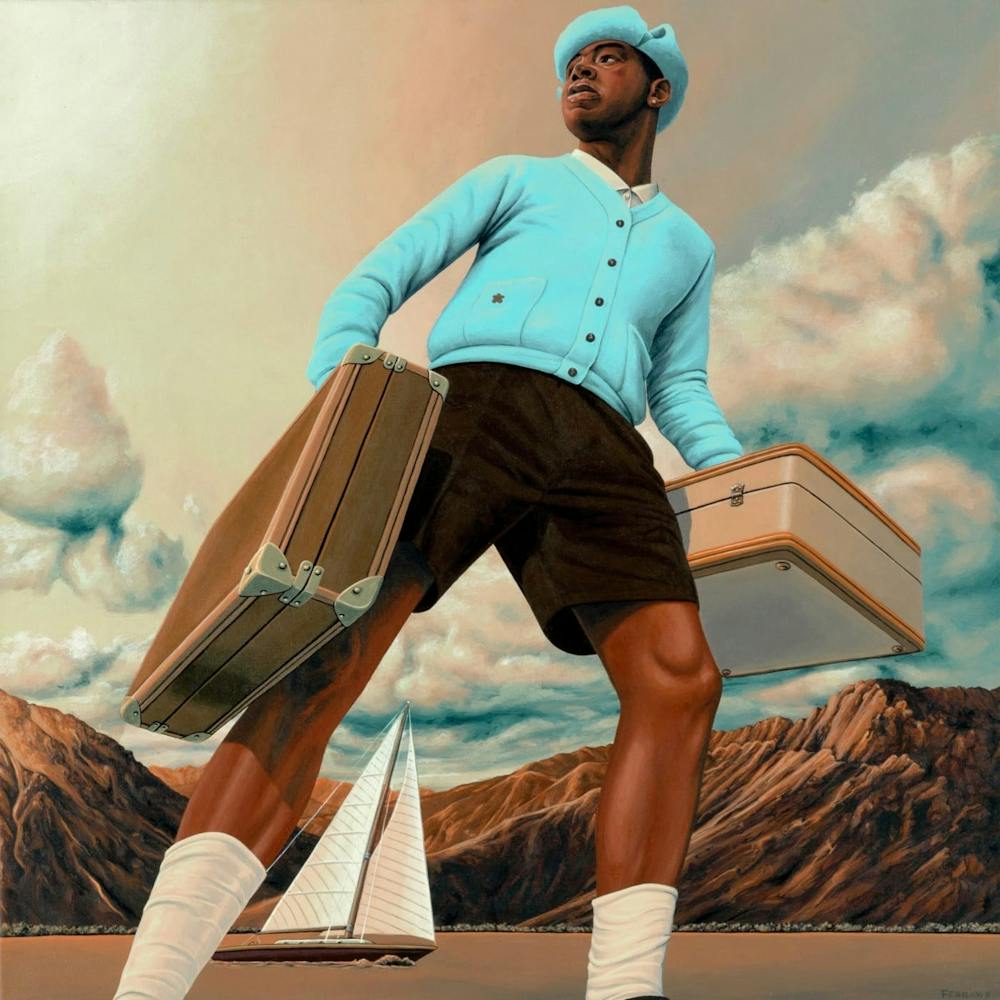Tyler, the Creator has always been a trendsetter. From his provocative beginnings as the eccentric, foul-mouthed musical backbone of the Odd Future collective to his unstoppable run of one mixtape and six albums in only twelve years – in which he’s won two Grammys for consecutive projects and produced all but one song –Tyler has always had a way of leading the crowd. Countless memes have documented his fans’ tendency to style their wardrobes after him, a tradition that’s survived every iteration of his aesthetic. The Tyler faithful were happy to exchange their green ski masks for five-panel Supreme hats, and, with the release of the highly acclaimed “Call Me If You Get Lost,” their GOLF brand fitted caps for ushankas.
Throughout his decorated career, Tyler has not only used his taste-making powers to grow his fanbase and cement his legacy, but also to completely reconfigure public opinions on certain topics. Following the invention of Call Me If You Get Lost’s central persona, a globetrotting romantic named Tyler Baudelaire, patterned sweater vests, dress shorts and oxfords have never been more in vogue. In fact, Tyler’s personal fashion – which like his other personas has perfectly mimicked that of his character’s, and the success of the album – has breathed new life into a Black-boy-from-the-Hamptons look that previously seemed doomed to comic relief and accusations of selling out. While it’s true that the fashion of musicians like A$AP Nast – who has publicly accused Tyler several times of stealing his style – and Dev Hynes, a friend of Tyler’s, has occasionally stepped into snooty lawn tennis territory, no one has come close to committing to and promoting the style the way Tyler has. A paparazzo would be hard-pressed to find him in anything unsuitable for a sumptuous picnic or brunch these days.

In the past, representations of Black decadence were largely restricted to what we’ve come to expect from big-spending rappers or businessmen. Though the Kanye West of the 2000s challenged traditional hip-hop fashion standards with his flashy polo shirts and sweaters, their combination with designer jeans, belts, and lengthy gold chains kept him palatable for less inventive audiences. The same can be said for the CEO chic of Rick Ross and Drake, who often sported designer sweaters, expensive rings, frames, and even cigars in the 2010s, the latter most notably in the 2011 music video for “Headlines.” Even though they didn’t look like your average rapper, they never risked looking anything short of cool. Rich “urban” Black men (a term Tyler famously criticized for its demeaning nature) were meant to drive foreign cars and wear sparkling chains. Black businessmen were meant to look like FUBU and Shark Tank’s Daymond John, or the no-nonsense sides of Jay-Z and P. Diddy: diamond earrings, suits, and forty-thousand-dollar watches.
As a result of these immutable standards, the singing, dancing, primly dressed and mannered Black man typically only existed as comical cannon fodder. The comedy of Alfonso Ribeiro’s legendary portrayal of “The Fresh Prince of Bel-Air’s” Carlton Banks, a character who never met a sweater vest or bow tie he didn’t like, was entirely hinged on Carlton’s contrast to Will Smith’s character, a typical Black teenage everyman. While Black audiences could mostly relate to Will, Carlton’s exaggeratedly privileged sense of style, corny dancing, and monomaniacal fixation on a Princeton education rendered him a perfect comedic foil. Carlton even defended himself from a sellout accusation on the episode “Blood Is Thicker Than Mud,” where a college fraternity rejects him solely because of his privileged background. “The Boondocks” Tom Dubois (whose name is a play on the “Uncle Tom” or Black sellout stereotype), a hopelessly inept but well-to-do Black lawyer and Princeton graduate, inhabits the same realm of comedic otherness. Such was the case of rapper and former personal assistant to P. Diddy, Fonzworth Bentley, whose haughty etiquette, formal attire, and signature umbrella placed him at odds with the rappers he appeared alongside.
Tyler’s recent styles and personas have taken all the risks associated with this otherness and emerged victorious. What other rapper could elevate a blonde bowl cut and a pink suit to an iconic, Grammy–winning status? The lush, vibrant imagery of his self-directed music videos for “Lemonhead,” “A Boy Is A Gun*” and other songs place his expertly crafted and revolutionary aesthetic on full display. It also delightfully and effectively challenges preconceived notions of hip hop and R&B visuals respectively. His second of two successful fashion lines, GOLF le FLEUR*, began selling high-end luggage and a fragrance last year; the former being previously untrodden territory for a rapper, and the latter second only to a line of cologne by Rocawear, a brand co-founded by Jay-Z.
No matter what Tyler is doing, you can expect him to push the envelope, and we can certainly consider this one pushed to completion. Be assured that he’s never known the definition of the word “stop.” From his abrasive beginnings, twelve acclaimed years, two Grammys and incalculable creative influence, he has blossomed, and he’s only getting started. If his greatest and most revolutionary achievement could be summarized in one sentence, it would probably be a line from “Where This Flower Blooms” from 2017’s Grammy-nominated release “Flower Boy” – his successful mission to “tell these Black kids they could be who they are.”


